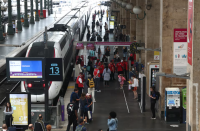(Reuters) – Retired English soccer captain David Beckham lobbied Miami lawmakers on Wednesday to approve his proposed 25,000-seat soccer stadium on the city’s prized bayfront real estate.
Beckham, wearing a tailored dark suit, went door-to-door in Miami-Dade lawmakers’ offices in downtown Miami throughout the morning and afternoon, meeting with commissioners and posing for pictures.
Beckham’s plan for a futuristic, waterfront stadium near the port of Miami to house a new Major League Soccer (MLS) franchise has run into resistance from a group led by Royal Caribbean Cruises, which argues that it would interfere with cruise and cargo operations.
An alternative proposal offered by Miami-Dade Mayor Carlos Gimenez this week would locate the stadium on another nearby downtown waterfront site, currently a boatslip, sandwiched between an art museum and the Miami Heat basketball arena.
“If they want to have a piece of property there … they would have to bear the cost of filling the slip in,” Gimenez said, pegging the cost between $12 million and $18 million.
Gimenez said the land could be worth as much as $50 million.
“It’s another option it gives us another location which has come out of the blue,” Beckham told reporters outside county hall on Wednesday.
“It’s gone from having one great possible location to two. We’re very happy.”
Beckham said he never expected a “smooth ride” getting stadium approval. “Investors and I will be putting up a quarter of a billion dollars … we don’t want to bring worries,” he said.
Beckham along with his partners Simon Fuller, creator of American Idol, and Bolivian-born billionaire Marcelo Claure, founder of Miami-based Brightstar Corp, say they will pay the county tax and rent. The group plans to privately finance the $250 million stadium construction.
Beckham has yet to reveal who his investors are.
The mayor’s alternative plan has already drawn the ire of several critics, including former Miami Mayor Manny Diaz and a handful of former city commissioners who said the space should become parks and plazas for the tens of thousands of downtown Miami residents now living in the city’s high rises that once sat empty following the city and nation’s real estate collapse.
“Miami has become one of the world’s leading urban centers, fulfilling its long awaited destiny … let us not purge this gift by building a stadium where it does not belong,” Diaz wrote in a widely circulated Wednesday email.
(Editing by David Adams and Cynthia Osterman)






